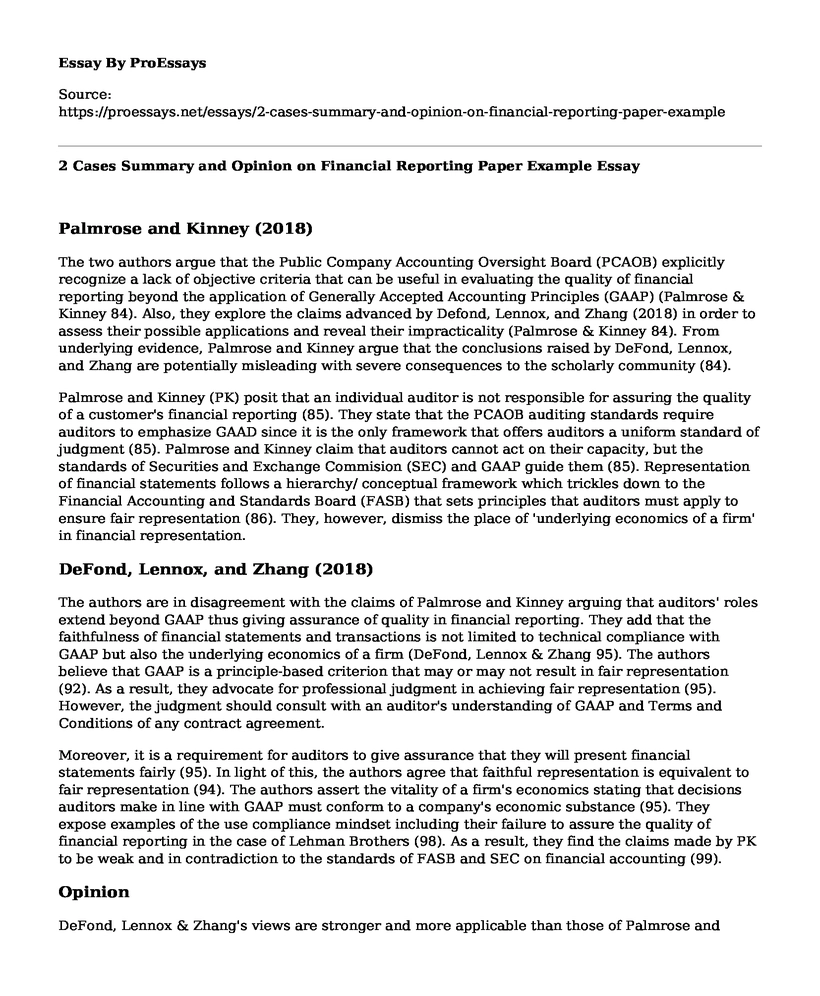Palmrose and Kinney (2018)
The two authors argue that the Public Company Accounting Oversight Board (PCAOB) explicitly recognize a lack of objective criteria that can be useful in evaluating the quality of financial reporting beyond the application of Generally Accepted Accounting Principles (GAAP) (Palmrose & Kinney 84). Also, they explore the claims advanced by Defond, Lennox, and Zhang (2018) in order to assess their possible applications and reveal their impracticality (Palmrose & Kinney 84). From underlying evidence, Palmrose and Kinney argue that the conclusions raised by DeFond, Lennox, and Zhang are potentially misleading with severe consequences to the scholarly community (84).
Palmrose and Kinney (PK) posit that an individual auditor is not responsible for assuring the quality of a customer's financial reporting (85). They state that the PCAOB auditing standards require auditors to emphasize GAAD since it is the only framework that offers auditors a uniform standard of judgment (85). Palmrose and Kinney claim that auditors cannot act on their capacity, but the standards of Securities and Exchange Commision (SEC) and GAAP guide them (85). Representation of financial statements follows a hierarchy/ conceptual framework which trickles down to the Financial Accounting and Standards Board (FASB) that sets principles that auditors must apply to ensure fair representation (86). They, however, dismiss the place of 'underlying economics of a firm' in financial representation.
DeFond, Lennox, and Zhang (2018)
The authors are in disagreement with the claims of Palmrose and Kinney arguing that auditors' roles extend beyond GAAP thus giving assurance of quality in financial reporting. They add that the faithfulness of financial statements and transactions is not limited to technical compliance with GAAP but also the underlying economics of a firm (DeFond, Lennox & Zhang 95). The authors believe that GAAP is a principle-based criterion that may or may not result in fair representation (92). As a result, they advocate for professional judgment in achieving fair representation (95). However, the judgment should consult with an auditor's understanding of GAAP and Terms and Conditions of any contract agreement.
Moreover, it is a requirement for auditors to give assurance that they will present financial statements fairly (95). In light of this, the authors agree that faithful representation is equivalent to fair representation (94). The authors assert the vitality of a firm's economics stating that decisions auditors make in line with GAAP must conform to a company's economic substance (95). They expose examples of the use compliance mindset including their failure to assure the quality of financial reporting in the case of Lehman Brothers (98). As a result, they find the claims made by PK to be weak and in contradiction to the standards of FASB and SEC on financial accounting (99).
Opinion
DeFond, Lennox & Zhang's views are stronger and more applicable than those of Palmrose and Kinney. Palmrose and Kinney's claims expose a misunderstanding of the two most vital concepts of accounting, fair representation as an equivalent to faithful representation. DeFond, Lennox & Zhang's arguments agree with these terms and constantly remind that auditors cannot individually assure faithful representation. Their arguments present an explicit understanding of the place of GAAP and other accounting standards in promoting quality of financial reporting.
Moreover, Defond, Lennox, and Zhang (2018), unlike Palmrose and Kinney (2018), confirm the importance of professional judgment and not sole compliance with GAAP in emphasizing the authoritative standards of accounting. In other words, Palmrose and Kinney's claims are insufficient, and they reveal their lack of emphasis on fair representation of financial transactions. Palmrose and Kinney also fail to ascertain that GAAP's ultimate goals of fairness and accuracy in reporting are not limited to technical compliance but also a rigorous decision-making process by auditors. Therefore, DeFond, Lennox & Zhang's views are significant and applicable.
Works Cited
DeFond, Mark L, et al. "The primacy of fair presentation- Evidence from PCAOB standards, federal legislation, and the courts." Accounting Horizons 32.3 (2018): 91-100.
Palmrose, Zoe-Vonna., and William R. Kinney Jr. "Auditor and FASB responsibilities for representing underlying economics-What US standards actually say." Accounting Horizons 32.3 (2018): 83-90.
Cite this page
2 Cases Summary and Opinion on Financial Reporting Paper Example. (2022, Nov 06). Retrieved from https://proessays.net/essays/2-cases-summary-and-opinion-on-financial-reporting-paper-example
If you are the original author of this essay and no longer wish to have it published on the ProEssays website, please click below to request its removal:
- Essay Example on Disclosure of an Organization
- International Monetary and Financial Environments
- Comparison of Budget Utilization Between Texas and Massachusetts Essay
- Case Study on Leo and Julie Retirement Plans
- Essay Sample on Mortgage Interest Rate
- Planning For Your Future - Essay Sample
- Essay Sample on 2020 Rhodes Budget: Investing in Education & Basic Services







